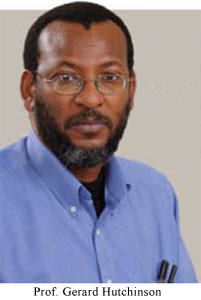Talks on suicide prevention in May

Dr Gerard Hutchinson, University of the West Indies professor of psychiatry, says “suicide and suicidal behaviour continue to be major problems for the health, education and social sectors in Trinidad.”
He added that TT needs to respond “more effectively and more comprehensively” in order to save more lives.
Hutchinson made the statement in a media release as the International Association for Suicide Prevention readies itself to host the third Caribbean Regional Symposium in TT from May 2-4. It will be held at the Hilton Trinidad, Port of Spain.
This symposium will focus on “evidence-based research, best practice and innovative suicide prevention activities,” a release said, and will also be an opportunity to encourage young researchers and practitioners.
The symposium will have over 30 presentations and will be attended by delegates from over 20 countries.
The media release said the symposium’s aim is to bring together researchers, practitioners, helpline workers, programme planners, graduate students and the community from within TT, the Caribbean and the world.
Suicide and suicidal behaviour, the release said, have emerged as “major public health problems in the Caribbean,” with Guyana and Suriname having been reported by the World Health Organisation (WHO) as among the countries with the highest rates of suicide in the world.
TT and Cuba, it added, also have “relatively high rates of mortality from suicide.”
The release said while other Caribbean countries have a lower suicide rate, suicidal behaviour and self-harm are “important public health and emergency department problems in most of the region.” Young people were “disproportionately” affected by this, with rates highest in young adults and “negatively affecting economic and social development,” it said.
The release said surveillance and reporting of suicidal behaviour was problematic and inconsistent, and few systematic suicide prevention programmes were in operation.
The release quoted Dr Lesile Ramsammy, a New York-based clinical research co-ordinator and Guyana Times columnist, who said, "National efforts to stem this raging river of destruction, death by suicide – a majority of which occurs among people suffering mental illness – are in disarray.
“Most national programmes to address this national and global crisis, where there are national programmes, suffer from a lack of commitment and an almost universal lack of resources.
"More than 90 per cent of the Caribbean countries lack a national strategy to respond to the suicide epidemic and none has a budget to support a suicide prevention programme."
Ramsammy will be the symposium’s keynote speaker.
The release added that a “cohesive and comprehensive response to suicidal behaviour in the Caribbean” was needed and improved services for individuals and families affected by suicidal behaviour and a commitment to establishing national suicide prevention programmes were the priorities requiring urgent attention.
Social and community prevention strategies, intervention protocols and "postvention" support (an intervention conducted after a suicide), the release said, were “sorely needed.”
The WHO’s fact sheet on suicide says, globally, close to 800,000 people die by suicide every year and suicide is the second leading cause of death among 15-29-year-olds.
The symposium will also feature workshops on national strategies, surveillance, gatekeeper training and building hope in hopeless situations.
More information can be found at https://iasp.info/trinidad2019/

Comments
"Talks on suicide prevention in May"